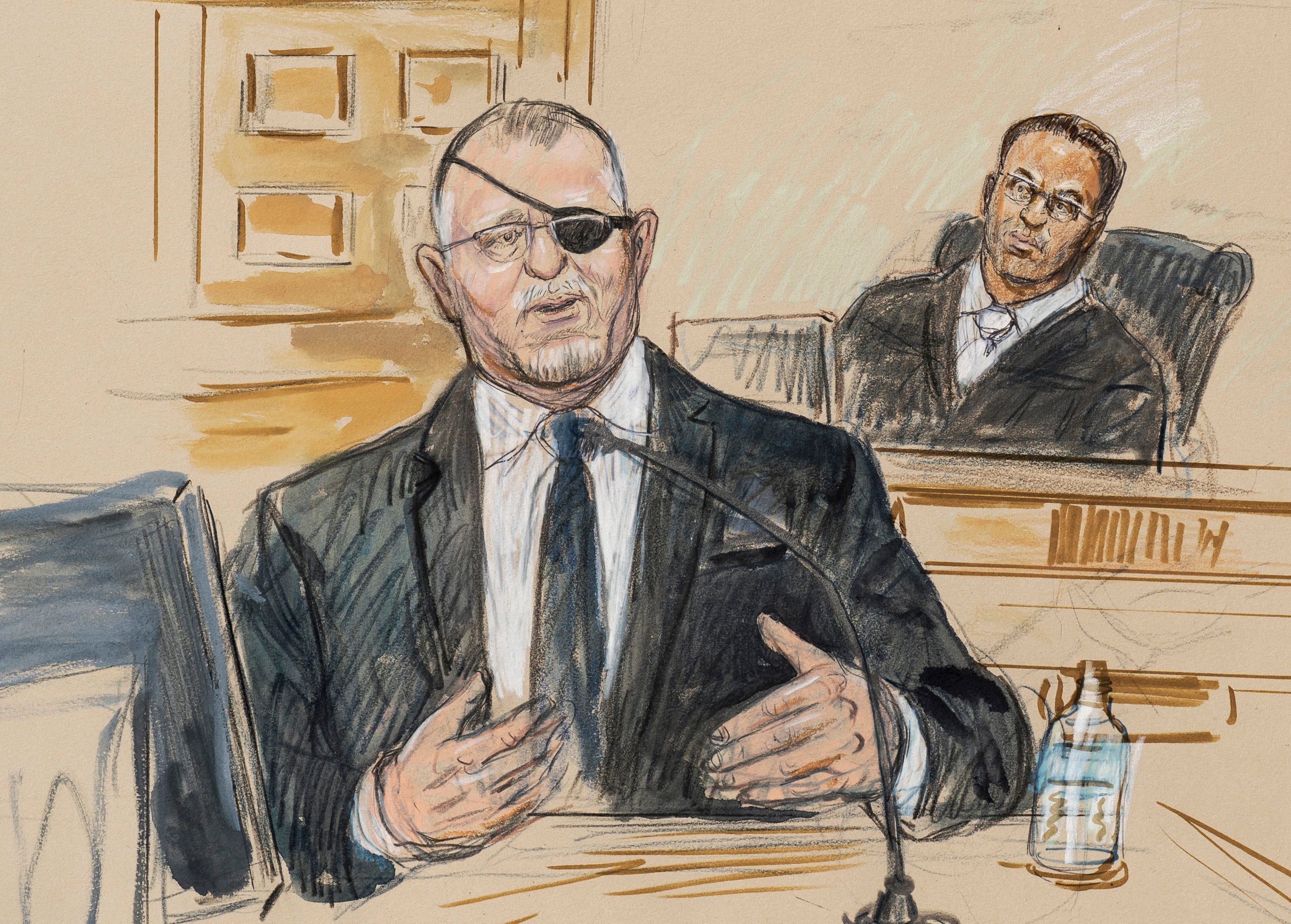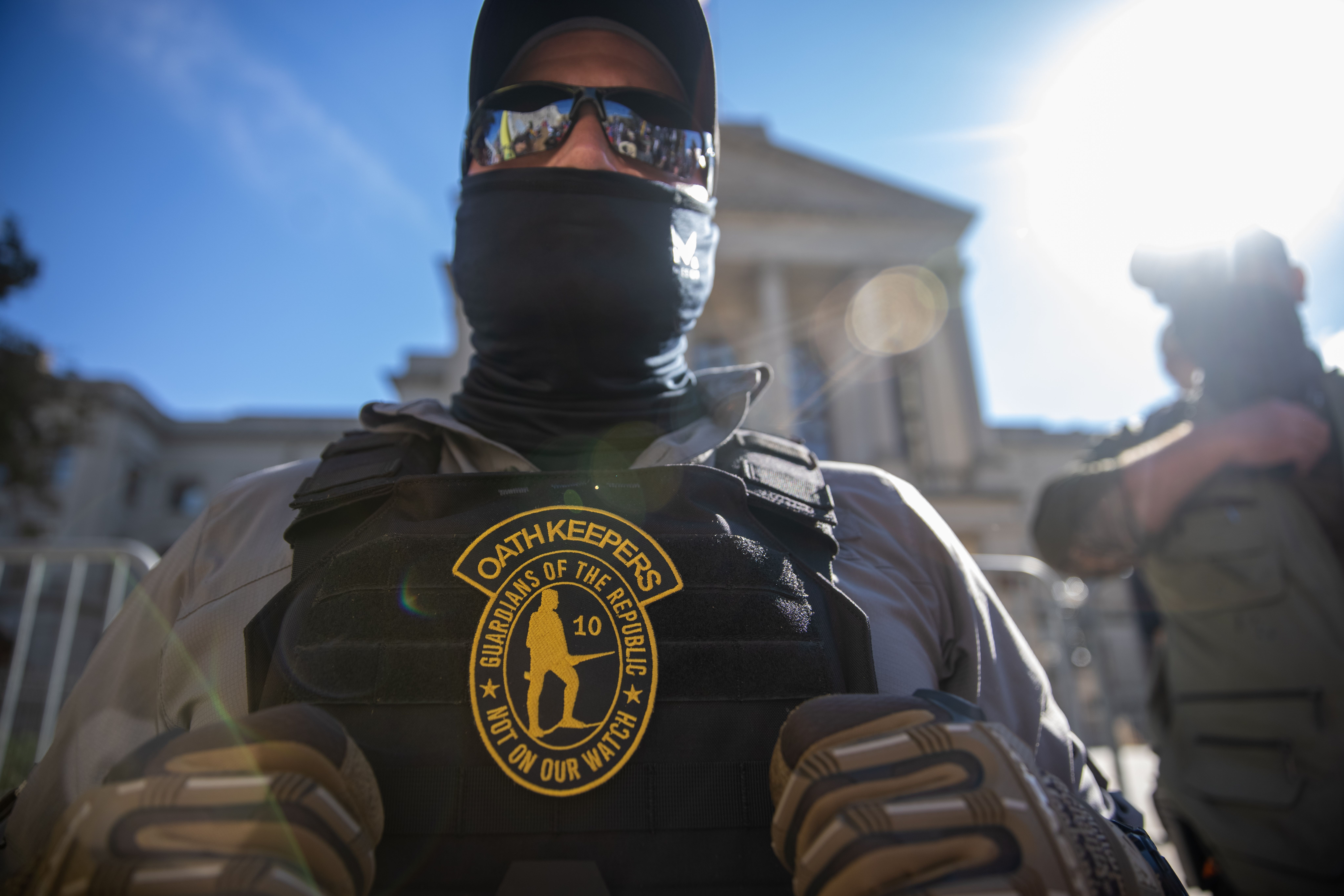Who are the Oath Keepers, extremist group whose leader has been sentenced to 18 years for Capitol riot
Group’s leader Stewart Rhodes sentenced to 18 years in prison for seditioous conspiracy
The leader of the far-right Oath Keepers anti-government militia has been sentenced to 18 years in prison after federal prosecutors argued he committed an act of terrorism on January 6.
Last year, a jury found Elmer “Stewart” Rhodes guilty of seditious conspiracy in connection with the attack on the US Capitol on 6 January 2021 in a violent attempt by Donald Trump’s supporters to overturn the results of an American election.
Rhodes is a former Army paratrooper and Yale Law School graduate who formed the anti-government extremist group and launched it at rally in Lexington, Massachusetts, in 2009.
He was dressed in a prison-issued orange jumpsuit during his sentencing hearing in US District Court in Washington DC on 25 May, at which he described himself as a “political prisoner.”
The Oath Keepers say that their mission is to defend the rights of Americans from the government, with the group’s name referring to the oath they have taken to defend the US Constitution “against all enemies, foreign and domestic.”
From its inception, observers say that the group has tried to recruit members of the military and law enforcement into its ranks.
In 2014 Mr Rhodes claimed that the group, which has chapters across the US, had 35,000 dues-paying members, although experts say that number is more likely to be around 5,000.
According to the Southern Poverty Law Center, which monitors extremist groups, “the main crux of the group’s messaging asserts that the government is engaged in attacks against its own citizens, working to strip them of their civil liberties.”

The SPLC states that “the group advocates for Americans to prepare for inevitable conflict with the government by stockpiling goods and supplies, engaging in paramilitary training and working to create small, self-reliant community networks.”
Mr Rhodes has not shied away from his goal for the group.
“We want to see a restoration of the militia in this country,” he said during an appearance on the God and Guns podcast.
“We think a good first step is to have the veterans stand up in every community and go help form and train neighborhood watches, to get the people to take back into their own hands their own personal self-defense and security.”

Since its formation, the group has shown up at a string of high-profile incidents across the US.
In April 2014, they took part in the protest at the Nevada ranch of Cliven Bundy but left amid false claims that the Obama administration was going to launch a drone attack.
They also showed up in Ferguson, Missouri, following the death of Black teen Michael Brown, where police said they illegally tried to protect local businesses from rioters without proper licenses.
During the 2016 election, the group threw its support behind Donald Trump, claiming that the one-term president was an ally in the fight against a “corrupt elite.”
And following the 2020 election Mr Rhodes pushed Mr Trump’s false claims of a stolen election, urging people at a Stop the Steal rally in Virginia to not accept Joe Biden’s victory.
“What do you have right now if nothing but a communist insurrection intent on overthrowing our Constitution?” he told the rally.
After a nearly two-month trial, Rhodes and Oath Keepers member Kelly Meggs were found guilty of seditious conspiracy after jurors deliberated for three full days. Three other Oath Keepers associates were charged in the case but were found not guilty.
Rhodes and his allies spent weeks discussing a violent response to the 2020 election on encrypted messaging apps, then organised a weapons and supply cache at a nearby hotel before joining the mob that broke through the Capitol’s doors and windows to storm the halls of Congress and block the certification of Joe Biden’s presidency, according to federal prosecutors.
US District Judge Amit Mehta told the court on 25 May that seditious conspiracy “is among the most serious crimes an individual American can commit” and an “offence against the people of the country.”
“What we cannot have, we absolutely cannot have, is a group of citizens who because they didn’t like the outcome … were then prepared to take up arms in order to foment a revolution. That’s what you did,” he told Rhodes. “You are not a political prisoner, Mr Rhodes.”
For decades, Rhodes wanted American democracy to “devolve into violence,” Judge Mehta said.
“You, sir, present an ongoing threat and a peril to this country and its democracy and the very fabric of this country,” he added. “You are smart, you are compelling, and you are charismatic. Frankly, that is what makes you dangerous.”



Bookmark popover
Removed from bookmarks